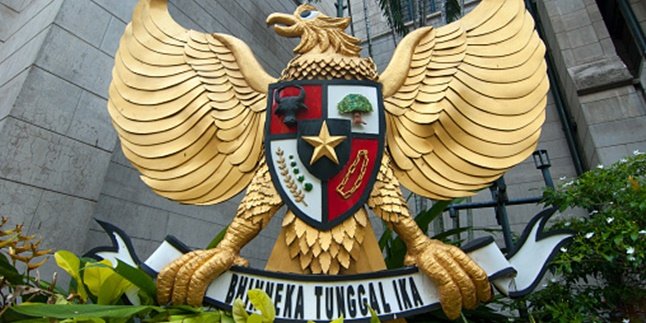Kapanlagi.com - Pancasila as the foundation of the state contains the meaning that Pancasila is a final agreement and widely accepted by the Indonesian society. This has been agreed upon by the founding fathers of the nation, so it is called a sacred agreement that must be firmly upheld.
The establishment of Pancasila as the foundation of the state contains the meaning that Pancasila is the embodiment of the aspirations of all Indonesian people. This was established on August 18, 1945 by PPKI, when Indonesia had just gained independence. The diversity in this nation becomes more beautiful if the people truly uphold the values of Pancasila.
As someone who is Indonesian, it is important for you to understand the meaning of Pancasila. Pancasila as the foundation of the state contains the meaning that Pancasila is the source of the national basic law. All regulations in this country are derived from Pancasila. Now, to gain a deeper understanding, please read the following explanation.
1. The Function of Pancasila as the Foundation of the State

Illustration (Credit: Unsplash)
Pancasila as the foundation of the state means that Pancasila is the source of law for the Unitary State of the Republic of Indonesia (NKRI). This is one of the functions of Pancasila as the source of all legal sources. Pancasila becomes a way of life, consciousness, and aspirations of law along with the moral ideals that include the character of the Indonesian nation.
In addition, there are still many functions of Pancasila for NKRI, including:
1. Pancasila as the foundation of the Indonesian state.
Pancasila becomes the basis for organizing state apparatus in accordance with the content stated in the opening of the 1945 Constitution.
2. Pancasila as the way of life of the Indonesian nation.
Pancasila becomes a guide for the implementation of the daily life of the Indonesian people who are united in NKRI.
3. Pancasila as the personality of the Indonesian nation.
The embodiment of Pancasila values can be seen from the attitudes and various actions or behaviors of the Indonesian society. These attitudes can be considered as the distinctive personality of the Indonesian nation.
4. Pancasila as the soul of the Indonesian nation.
Quoting Liputan6, according to Prof.Mr.A.G.Pringgodigdo in his writing entitled Pancasila, Pancasila has existed since the establishment and development of the Indonesian nation in the kingdom era. However, the term Pancasila was only known on June 1, 1945.
5.Pancasila as the source of all legal sources.
Pancasila as the source of all legal sources means an instrument to realize the aspirations of the law and the moral aspirations of the Indonesian nation. These aspirations include individual freedom, national or state independence, humanity, social justice, and national peace, which are the rights and obligations of citizens.
6.Pancasila as the noble agreement of the Indonesian nation.
Pancasila as the noble agreement is related to the oath made when proclaiming the independence of the Indonesian nation together by the founders of the Indonesian nation.
7.Pancasila as the philosophy of life of the Indonesian nation.
Pancasila contains noble values and norms and is believed to be the most correct, fair, wise, and appropriate for the Indonesian nation to be able to unite all the Indonesian people.
8.Pancasila as the aspirations and goals of the Indonesian nation.
The aspirations and goals of the Indonesian nation referred to are explicitly stated in the preamble of the 1945 Constitution.
9.Pancasila as the ideology of the Indonesian nation.
Pancasila is considered as the vision or direction for the organization of national life in Indonesia. By making Pancasila as an ideology, the Indonesian nation can realize a life that upholds divinity, human values, awareness of unity, democracy, and upholds the value of justice, including social justice.
2. The Meaning of Pancasila as the Foundation of the State

Illustration (Credit: Freepik)
Pancasila as the foundation of the state means that Pancasila becomes the source of national basic law. This is stated in the Decree of the People's Consultative Assembly of the Republic of Indonesia Number III/MPR/2000 concerning the Sources of Law and the Order of Legislation.
Article 1 states that:
"The source of national basic law is Pancasila as stated in the Preamble of the 1945 Constitution, namely Belief in the One and Only God, Just and Civilized Humanity, the Unity of Indonesia, Democracy led by the Wisdom of Deliberation/Representation, and the realization of Social Justice for all Indonesian People, and the body of the 1945 Constitution."
3. Pancasila as the Foundation of the State Means that Pancasila becomes the Source of National Basic Law

Illustration (Credit: Pixabay)
As explained above, Pancasila is the source of the national basic law. Pancasila as the foundation of the state means that Pancasila is also stated as the source of the national basic law in MPR Decree No. III/MPR/2000.
It means that Pancasila as the foundation of the state functions to regulate the entire order of life and the nation of Indonesia. Everything related to the implementation of the state administration of the Republic of Indonesia must be based on Pancasila. All regulations in Indonesia must be based on Pancasila.
Pancasila can be said as the guiding principle and bond that unites the Indonesian nation. Pancasila as the foundation of the Indonesian state is also stated in MPR Decree No. XVIII/MPR/1998. The wording of article 1 in that decree is as follows:
Pancasila as referred to in the Preamble of the 1945 Constitution is the foundation of the state of the Unitary State of the Republic of Indonesia and must be consistently implemented in state life.
That is the explanation regarding the function and meaning of Pancasila as the foundation of the state that you need to know as Indonesian citizens.
(Source: liputan6.com, setkab.go.id)
(kpl/gen/ans)
Disclaimer: This translation from Bahasa Indonesia to English has been generated by Artificial Intelligence.















